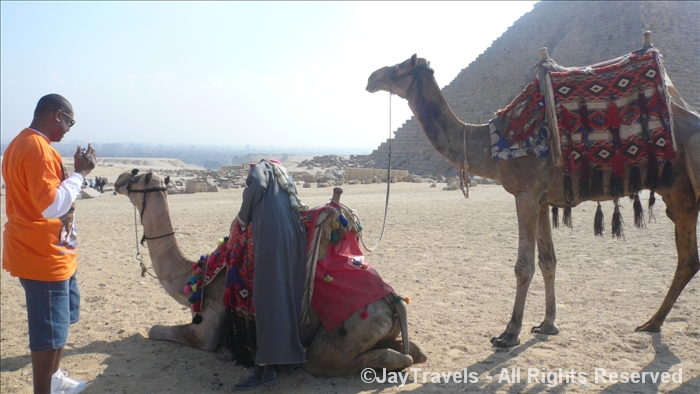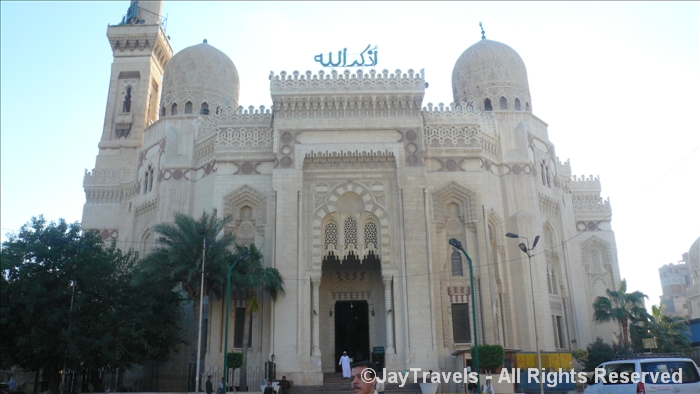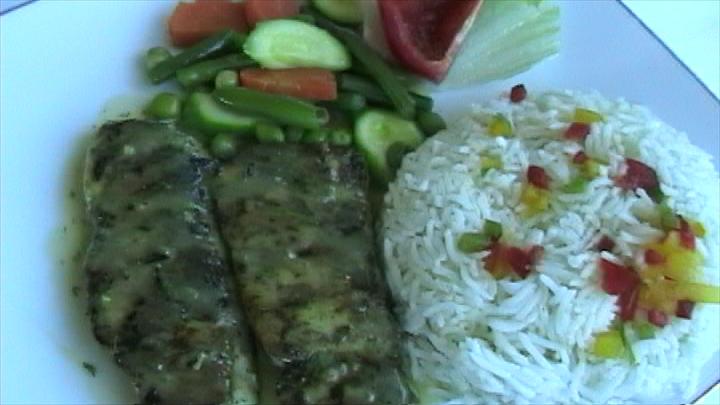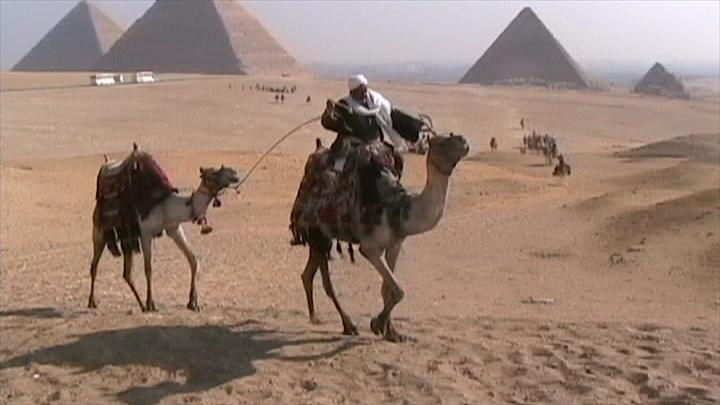Egypt – The History of Civilization
Posted By Jay On September 23, 2009 @ 1:15 am In Bucket List & Future Plans,International Travel Reviews,Spotlight Adventure - Egypt | 1 Comment
A once in a lifetime experience. The Great Pyramids and the Sphinx was just the start. Read about my adventures to cosmopolitan Alexandria and Luxor – the cradle of civilization.
Destination at a Glance |
||||
| Date of Trip | September/ 2008 | |||
| Destination Good for | Adventure, Beach, Honeymoon, History/Culture | |||
| Cities Visited | Cairo, Alexandria, and Luxor | |||
| Currency/Conv. Rate | Egyptian Pound / 1 USD equaled 5 pounds (Favorable) | |||
| Good Way to Get Around | Rent Car: No | Public: No | Taxi: Yes | Walking: Yes |
| Appox. Trip Cost | Expensive | |||
| Speaks English? | Tourist areas only | |||
| Entry Requirements | Passport – $15 temporary visa at airport | |||
| Do it |
|
|||
| Skip it |
|
|||
| Didn’t get to do |
|
|||
| Would I Recommend | Absolutely | |||
| Overall Trip Rating | ||||
Trip Review
The Northwest African country of Egypt has a history as old as history itself – as many historians believe modern civilization started in this great land. I spent a week traveling through Egypt’s more interesting cities; Cairo – the large metropolitan business hub, Alexandria – the Mediterranean and cosmopolitan beachfront city and Luxor (formally Ancient Thebes) – ground zero for history and culture in the country.
The Arrival
As I arrive at the hotel, one of the first things I notice is the level of security deployed on just about every block. As I remembered, there had been a bombing in Egypt two years earlier related to the Israeli-Palestinian conflict. Egypt is officially neutral on the conflict and needs tourism dollars to feed into its economy. To protect those dollars, the government has taken extraordinary steps to ensure the safety of all citizens – but tourists in particular. On almost every corner – there are either military solders with .jpg) AK-47s, uniformed police, undercover secret police with Uzis hanging out of their jackets – or all three! My initial thoughts were – whoa – what the hell is going on here that this is necessary? After about 10 minutes – I felt like I was in the safest place on the planet – no one, I mean no one even looked like they were going to start something. In fact, I get the impression all of the firepower was targeted towards foreigners from other Middle Eastern countries looking to make some sort of statement – not the Egyptian people themselves.
AK-47s, uniformed police, undercover secret police with Uzis hanging out of their jackets – or all three! My initial thoughts were – whoa – what the hell is going on here that this is necessary? After about 10 minutes – I felt like I was in the safest place on the planet – no one, I mean no one even looked like they were going to start something. In fact, I get the impression all of the firepower was targeted towards foreigners from other Middle Eastern countries looking to make some sort of statement – not the Egyptian people themselves.
Getting Around
When venturing around Egypt, you have to decide the best way to get from point A to Point B – and how to communicate once you get there. Outside of many tourist locations, very few Egyptians speak English. When taking a cab in Cairo – it’s best to have someone in your hotel write down where you are going to pass to the cab driver.
.jpg) I should probably take a second to talk about the term ‘cab’ in Egypt. In most of the country, there are two terms used to reference paid assisted driver – cab and limo. A ‘Cab’ is easy to spot – they are Black and White 1980 Dotsun 4-door sedans – with no Air Conditioning. In case I didn’t mention it – average winter temperature in Cairo is 89 degrees – up to 105 degrees in the summer. Nuff Said. On the other hand, ‘Limos’ have AC – but aren’t what Americans would call a limousine, they are… wait for it…. Toyota Corollas. Nice.
I should probably take a second to talk about the term ‘cab’ in Egypt. In most of the country, there are two terms used to reference paid assisted driver – cab and limo. A ‘Cab’ is easy to spot – they are Black and White 1980 Dotsun 4-door sedans – with no Air Conditioning. In case I didn’t mention it – average winter temperature in Cairo is 89 degrees – up to 105 degrees in the summer. Nuff Said. On the other hand, ‘Limos’ have AC – but aren’t what Americans would call a limousine, they are… wait for it…. Toyota Corollas. Nice.
Private Guides vs. Group Tours
When on vacation, you may wish to have a professional guide and explain the history and details of the location and/or exhibit. In my experience, Group Tours can be an inexpensive way to see a location. The downside is you are likely to be herded around like cattle and at the mercy of the scheduling of someone else.
On the other hand, private tour guides in Egypt are the best in I’ve ever encountered – period. In Egypt, you just can’t roll over one day and say – “hey, I know the area – I’m gonna be a tour guide”. Each candidate was to take at least 4 years of college with an emphasis on the history of Egypt, must be fluent in a minimum of 3 languages (Egyptian hieroglyphics mandatory) and get recertified every two years. All this training makes them the most knowledgeable and competent guides I have ever come across in terms of the Egyptian history and its landmarks. They also possess the necessary contacts throughout the community to assist their clients with getting the best experience – whether discounts, warnings of scams, etc. I used 3 different official guides to three different cities – each one was exceptional. I wholly recommend this option instead of the group tour deal.
Cairo
.jpg) The 16th largest city in the world, Cairo feels more like many US large cities than a desert oasis. Major corporations like Oracle, Microsoft and KPMG have enormous buildings in and around downtown Cairo – not to mention all of the popular hotel chains like the Hilton, Marriot and Four Seasons. What makes Cairo a little different is the giant Nile River flowing through the middle of it – which has the advantages a waterway provides, such as cruise tourism and fresh seafood.
The 16th largest city in the world, Cairo feels more like many US large cities than a desert oasis. Major corporations like Oracle, Microsoft and KPMG have enormous buildings in and around downtown Cairo – not to mention all of the popular hotel chains like the Hilton, Marriot and Four Seasons. What makes Cairo a little different is the giant Nile River flowing through the middle of it – which has the advantages a waterway provides, such as cruise tourism and fresh seafood.
Like any large city in the world, Cairo has the usual offerings, e.g., plays, concerts and the like. Here are a few I indulged:
- Cairo Tower – The tallest free standing monument in the city, the tower is located in downtown Cairo just off the banks of the Nile River. From the top of the structure, you can see up to 100 miles on a clear day – easily capturing the Great Pyramids & Sphinx in nearby Giza. The restaurant on the top floor also serves as an enclosed observation deck – making the 360 degree rotation in little over an hour. About $15 for outside observation deck only.
- The Egyptian Museum – The primary museum in Cairo houses the most extensive collection of statues and artifacts from the period than any other museum in the world. The official home of King Tut’s tomb, nearly 30 mummies of different Pharaohs and their families, scepters, crowns, thrones and almost anything else you can think of (like teeth). This place is so huge it takes up almost two city blocks. Very impressive! The only thing that sucked was that no photography or pictures were allowed.
- Khan el-Khalili Bazaar (Cairo Market) – A giant swap meet in Old Cairo that if nothing else, will give you a genuine Egyptian shopping experience. Other than the Chinese, the Egyptians take bartering to an entirely new level. This is not for the faint of heart – if you are silly enough to pay what’s on the sticker – they are smart enough to sell it to you. Just understand nothing in the market is “authentic [insert_priceless_artifact]” and you’ll have fun. One word of caution – this bazaar is where I ran into Scam Dude – so keep your wallet safe and stay in an area where there are crowds.
…Continued
The Great Pyramids & Sphinx
One of the 8 Wonders of the World, these ancient structures have been standing since 2600 BC. The first thing I learned is the Pyramids are in fact tombs. The Egyptians built the tombs to preserve the bodies of the Pharaohs until such time they would return to their earthly form. Because all of the jewels have long since been looted or moved to museums, there’s very little to see inside of the Pyramids themselves – just dark and cramped. Nevertheless, the sheer size and the fact that these things are still standing after such a long period of time is amazing.

Memphis & Necropolis
The original capital of Egypt, Memphis was the city that bound Upper and Lower Egypt. In present day, it is a home of a few artifacts from the Old Kingdom. The best of which is the giant statue of Pharaoh Ramesses II that sits in an open air museum. This statute is about 40ft long and in almost pristine condition. In fact, you have to climb two flights of stairs to actually see the entire structure. Not far from this site are the step pyramids and funerary complex of Djoser.
Alexandria

- Catacombs – A completely stone set of chambers used to house the tombs of post-ancient Egyptian monarchy. While not as intricate as the ancient Pharaohs tombs, it is a very interesting look at the mingling of Egyptian and European (Greek & Roman) burial rituals. Unfortunately, no pictures were allowed.
- Beach – Again, most people think of desert when they thing of Egypt. While there is certainly a lot of desert – a good 40% of the countries’ border is covered by water (Mediterranean & Red Seas and Nile River). In Alexandria, this means there are beaches as far as the eye can see – with the requisite hotels in the background. If not for the Arabic street signs, the places doesn’t look any different than Cancun, Mexico! And with 105 degree summer temperatures – the beach is necessity.
- Dictators Complex – This place is notable because of its sheer size – it takes up almost 5 miles. Originally built as the palace of one of the Egyptian rulers in the 1950s (Farouk I think) – it included a palace, shipyard, personal sport fields – even a railroad. After being forced out via a coup, the complex has been turned into a tourist playground – including several hotels, marina, etc.
- Citadel of Qaitbay – Probably the best site in Alexandria, this 15th century fort on the shores of the Mediterranean Sea served as the first line of defense against invading armies. It includes a communal area, prison rooms, and canon firing positions.
Luxor (Ancient Thebes)
If when you think about Egypt you envision a sand filed desert and ancient statues of Pharaohs long gone – you are thinking of Luxor. About 450 miles south of Cairo, Luxor has been described as the world’s greatest open air museum. I certainly can’t think of anything so vast and utterly amazing. A good deal of the monuments would give current day architects trouble producing.
- Getting There – There are three good ways to get to Luxor from Cairo – by plane, by river cruise on the Nile and the option I took – overnight sleeping train. The Overnight train was pretty cool as it allowed you to see the sights while sitting in a comfortable cabin. While the cabins didn’t have flat screen TVs and other Western amenities, they were private, had a bed and desk and included dinner. The train departs Cairo around 8pm – still enough sunlight in the summer months to get some good pictures as you leave the city. The train pulls into Luxor early in the morning. Not the most efficient method, but I would highly recommend the experience.
- Valley of the Kings and Queens – The Valley of the Kings is the larger of the two valleys that houses the tombs of former Egyptian Pharaohs (kings). There are over 60 ‘known’ tombs in this valley – many of which have over 20 chambers within a single tomb. As I mentioned earlier, the Egyptians believed in reincarnation – thus the Pharaohs were preserved and buried with most of their jewels. To ward off theft of these jewels, some of the chambers were booby trapped (think Indiana Jones). Whether booby trapped or not, the chambers and the tomb room themselves were covered in some of the most beautiful art work of the period. As the name implied, the Valley of the Queens is the smaller valley that has the tombs of the Queens and the Pharaohs off-spring – the most notable is Queen Nefertiti.
Luxor Temple – This place is off the chain. Seriously. It’s really just too amazing to describe but here are a few examples. The entryway to this temple has two enormous statues of King Ramesses II and his Queen. All around them are these huge – like 150ft tall huge – pillars that marked the cathedral sections. Also around of the remnants of these large columns of pointed stone – the tops of which were covered in Gold so that the Pharaohs could navigate at night using the reflection of the moon. Hundreds of small (4-5ft), medium (10-15ft) and large (30ft and up) litter the nearly 2 mile compound.
- Hidden Village – It’s not actually called the hidden village, but I can’t remember the name in Arabic. It is however exactly like it sounds – and entire village that was rediscovered by mistake. Part of the Luxor Temple, it was a small village just off the banks of the Nile. As Thebes fell as the epicenter of Egypt, the village itself was abandoned. As the centuries pasted, the village was covered in sand. Over a thousand years later, the conquering Muslim armies setup a church on top of the village – not even aware of what was 20ft beneath. During one of Egypt’s many sandstorms a cleric noticed a pointed ‘stone’ sticking out of the ground. This ‘point’ turned out to be the top of one of the village’s temples. A few years of excavation lead to the complete restoration of this village. If you look at the picture, your see the doorway to this church is 30ft in the air – proving the builders had no idea of what was beneath. Amazing.
Beggars
Overall, my travels throughout Egypt were extremely rewarding and enjoyable. If there was one thing that was a complete downer was the number of beggars throughout the country. No matter where you went, these people would try to sell you something or outright just ask for money. In many countries (US included), these types of people congregate around tourists areas – but not in Egypt. These MFs are everywhere – hotels, train stations, restaurants, as soon as you get off of the plane – everywhere! They have no shame and no problems following you as you walk to wherever you are going. Even though the security presence is on every corner – they can’t protect you from someone whose only crime is annoying the shit out of you. Just saying ’No’ doesn’t work – as our guide told us – “No is just the start of the conversation”. The only real way deal with them is to flat out ignore them and not make eye contact (imagine you are the pretty girl in the club). In Western culture, ignoring someone standing directly in your face is ultimate in rudeness – here it a necessity. Furthermore, they aren’t even offended – it’s on to the next person.
Food
Strangely enough, there really isn’t a concept of ‘authentic’ Egyptian food. Not really sure why, but the cuisine is actually Middle Eastern fare – not distinctively Egyptian. This means the menus consist of foods eaten across the region, such as Hummus (Chickpea dip/spread), Falafel (Fried Chickpea Patties), Pita Bread and some sort of Kabobs (Chicken, Seafood, or Beef). As Egypt is 80% Muslim, there are very few Pork dishes to be found in restaurants.
 Having said that, one thing that’s slightly different than many other Middle Eastern countries is Egypt’s proximity to seafood from the Mediterranean Sea and the Nile River. By far the best food I encountered in Egypt was the variety, freshness and preparation of local seafood. While in Alexandria (don’t remember restaurant name), the chef grilled several whole Sole caught just hours before. In Cairo, a restaurant moored along the Nile River called the Fish Market offers fresh fish by the pound. In this setup, all of the seafood is laid out on ice in front of you (over 20 varieties of fish & shellfish), you select the seafood you want and whether you want it grilled, steamed or fried. The chef weights the fish, cooks it and brings the seafood and whatever sides you want to your table. Very nice.
Having said that, one thing that’s slightly different than many other Middle Eastern countries is Egypt’s proximity to seafood from the Mediterranean Sea and the Nile River. By far the best food I encountered in Egypt was the variety, freshness and preparation of local seafood. While in Alexandria (don’t remember restaurant name), the chef grilled several whole Sole caught just hours before. In Cairo, a restaurant moored along the Nile River called the Fish Market offers fresh fish by the pound. In this setup, all of the seafood is laid out on ice in front of you (over 20 varieties of fish & shellfish), you select the seafood you want and whether you want it grilled, steamed or fried. The chef weights the fish, cooks it and brings the seafood and whatever sides you want to your table. Very nice.
In Closing
One of my best vacations, a wonderful new experience – worth visiting again. Frequently thought of as a desert country, I found this is far from the case. With water on over 40% of the Egyptian border, is home to some of the best seafood and sustains its number one export – cotton. I didn’t even get to see Aswan (further south from Luxor), cruise the Nile, cross the border into Israel (border currently closed), and partake in some of the best scuba diving in the world at Sharm el-Sheikh (Eastern coast in Red Sea). One of the few places where I felt like I’ve seen so much – and want to go back to see that much more.
Happy Travels
Article printed from Jay Travels: https://www.jaytravels.net
URL to article: https://www.jaytravels.net/egypt/
Click here to print.



